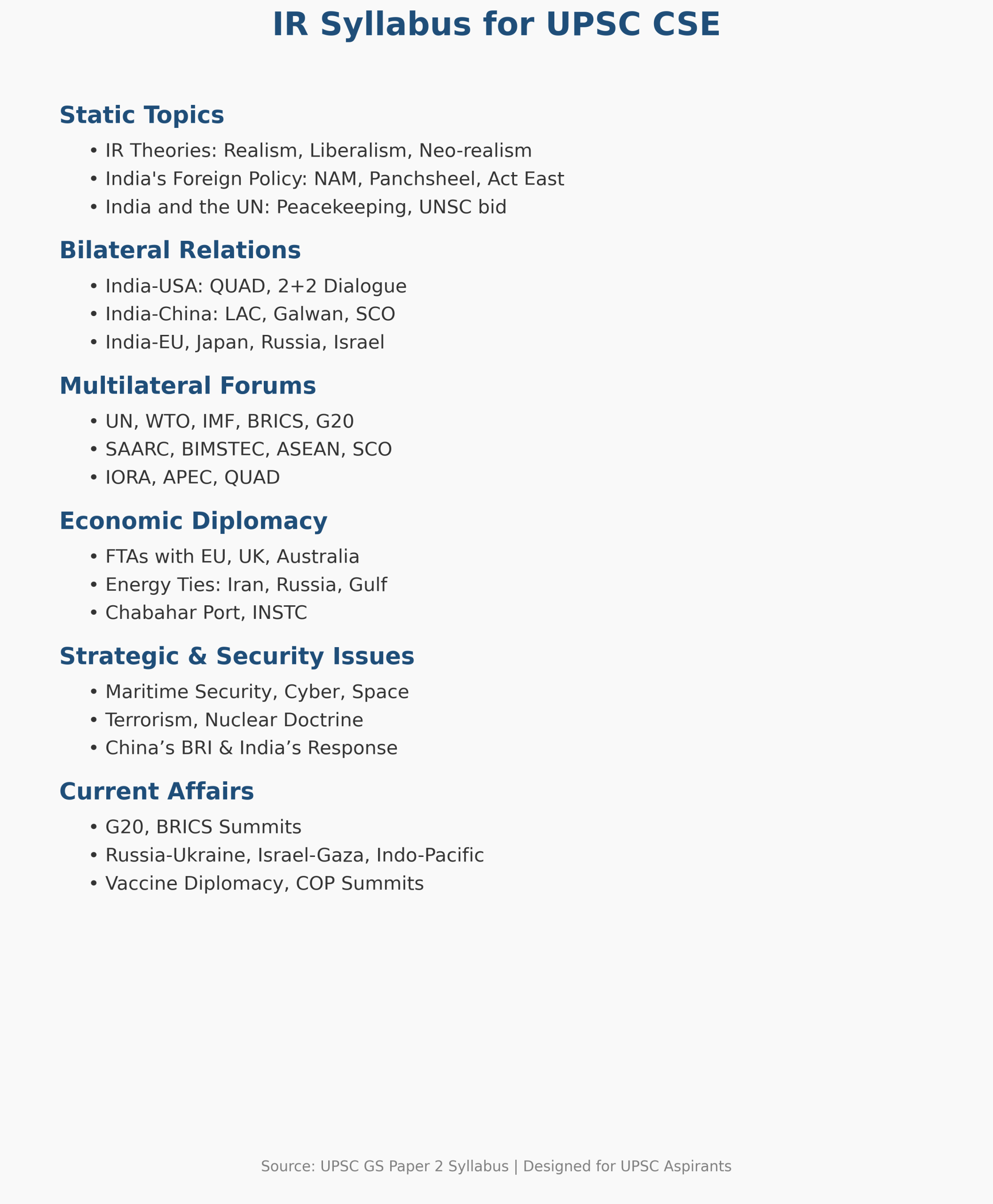
19 Jul IR Syllabus for UPSC CSE
IR Syllabus for UPSC CSE – Complete Guide to Prepare International Relations
📘 A. Static Topics in IR for UPSC
These are foundational concepts and historical frameworks that shape India’s foreign policy and global diplomacy.
1. Theories & Basics of International Relations
- Realism, Liberalism, Neo-realism, Neo-liberalism
- Balance of Power, Soft vs Hard Power, Collective Security
- Types of diplomacy – Track I, Track II, economic, cultural diplomacy
2. Evolution of India’s Foreign Policy
- Nehruvian policy, NAM and Panchsheel
- Gujral Doctrine
- Look East and Act East Policy
- Neighbourhood First Policy
- Strategic Autonomy and Multi-alignment
3. India’s Foreign Policy Machinery
- Ministry of External Affairs (MEA)
- Indian Foreign Service (IFS)
- Role of PMO, NSA, and Indian Think Tanks like IDSA, ORF
4. India and the United Nations
- UN Peacekeeping Operations
- UNSC Permanent Membership Bid
- Reforms in global institutions – IMF, World Bank, WTO, WHO
🌏 B. Bilateral Relations
This section of the IR syllabus for UPSC CSE focuses on India’s relations with key countries and regions.
1. India and Neighbors
- India–Pakistan: Kashmir, terrorism, Indus Waters Treaty
- India–China: LAC, Doklam, Galwan, BRICS, SCO
- India–Nepal: Border issues, Peace and Friendship Treaty
- India–Bangladesh: Teesta River, border agreements, connectivity
- India–Sri Lanka: Tamil issue, economic ties
- India–Bhutan, India–Myanmar, India–Afghanistan
2. India and Major Powers
- India–USA: 2+2 Dialogue, QUAD, civil nuclear deal
- India–Russia: S-400, defense and energy cooperation
- India–Japan: High-speed rail, Indo-Pacific cooperation
- India–UK: Trade, diaspora, post-Brexit ties
- India–EU: FTA talks, climate change, digital cooperation
- India–Australia: QUAD, education, uranium imports
- India–Israel: Defense, agriculture, innovation
🌐 C. Multilateral and Regional Groupings
Understanding India’s role in global and regional organizations is crucial for GS Paper II and essays.
1. Global Groupings
- UN, WTO, IMF, World Bank
- G20, G7, BRICS
- FATF, NSG, IAEA, MTCR
2. Regional Groupings
- SAARC, BIMSTEC, SCO, ASEAN, IORA, APEC
- QUAD and Indo-Pacific alliances
💹 D. Economic Diplomacy
- India’s role in WTO negotiations
- Free Trade Agreements (FTAs) with UK, EU, Australia
- Energy diplomacy: Oil from Gulf, Iran, Russia
- Connectivity Projects: Chabahar Port, INSTC, Kaladan
🔐 E. Strategic & Security Concerns
- India’s Maritime security in IOR
- China’s BRI, String of Pearls
- Cybersecurity, space security
- Global terrorism and India’s approach
- India’s Nuclear Doctrine and NFU policy
🔥 F. Dynamic Topics / Current Affairs in IR
IR is dynamic and highly dependent on current global events. Stay updated with newspapers and journals.
- India’s role in Ukraine-Russia war diplomacy
- Recent summits: G20, BRICS, SCO, QUAD
- India’s Vaccine Maitri and soft power
- Climate negotiations (COP summits, Paris Agreement)
- Developments in Indo-Pacific, Taiwan Strait, West Asia
- India’s response to UN reforms and UNSC expansion
📝 Preparation Strategy for IR in UPSC
- Understand basic theories and concepts first.
- Make topic-wise notes with static + current linkage.
- Follow newspapers like The Hindu, Indian Express.
- Refer to monthly magazines like Yojana, Kurukshetra, and MEA website.
- Practice answer writing with current examples and quotes.
- Use maps and flowcharts to improve presentation.
📚 Suggested Books & Resources
- Rajiv Sikri – *Challenge and Strategy*
- Pavneet Singh – *International Relations for UPSC*
- The Hindu / Indian Express – Editorials & Op-Eds
- IDSA, ORF, MEA.gov.in for India’s foreign policy updates
- Plutus IAS IAS Current Affairs compilations
🔚 Conclusion
The IR syllabus for UPSC CSE is both interesting and scoring if prepared systematically. With a blend of conceptual clarity and up-to-date information, aspirants can write impactful answers in Mains and express strong views in the Interview stage. Remember to link India’s interests, constitutional values, and global trends while crafting your answers.
Stay informed. Stay analytical. And most importantly, stay consistent.




No Comments